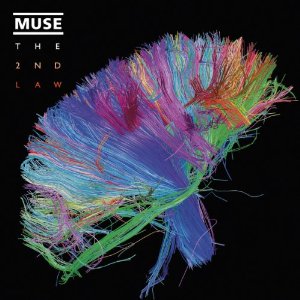Album Review: Muse ‘The 2nd Law’
 |
The story of this record for most fans seems to be that Muse has changed things up again, but that isn’t really the case from my perspective. Sure, there are a couple of new elements present, but it’s nothing outside of their already very broad lexicon. The fact that they have gone this far without going further almost seems to say that they are becoming musically unadventurous, not that they are sudden explorers.
Muse has always existed as a kind of bastard child of prog, somewhere between pop and very hard rock with a slight lean towards experimentation. It’s a strange realm in which to exist, because they have to work very hard to appeal to both rock audiences and clubbers, but they have done very well with it. Often compared to Radiohead, the similarities are few at this point in the careers of both bands. Early on they were certainly inspired heavily by OK Computer, but the Muse of today is a lot more like a modern version of Queen, with their huge themes and sometimes over-the-top, theatrical delivery.
“Supremacy” opens the album with a blatant, and evidently failed attempt by the band to create a Bond theme. When Matt gets to wailing on the chorus it certainly feels like Muse at full strength, where their last album was, at times, a bit diluted in some ways. It might be a bit too hokey and grand for some people to take seriously.
“Madness” appeals to an entirely different crowd. It is a supremely well crafted song, as well as the album’s lead single. It feels like it isn’t really going anywhere for a while, with a strange and subdued feeling that would rarely be a part of a club or a rock song, but in its final moments it explodes into a wash of more powerful, determined feelings and sounds which Muse has clearly come to be champions of. The song pays off.
There is no set of rules that dictates a band only make one type of music, and if comparisons to Radiohead or Queen are really necessary to define Muse then the most important parallel between all three bands should be that they have been willing to let the song and the subject matter dictate what sort of sounds they use, the instruments of their music, and even to whom they play and sing. Muse chooses a more simplistic and possibly less musically intelligent audience, but it is no less valid and no less have they mastered their craft.
They play with a few different sounds here, from “Panic Station” and its funk-inspired bass and vocal flair, to a straight up dubstep track for the first act of the album’s two-part closer. These songs are interesting diversions. It’s great that the band is making the effort to explore different areas of music, but these types of songs are not the meat of the album. The vast majority of songs on The 2nd Law would easily fit onto any Muse record after Absolution.
“Follow Me” is an example of a track not explicitly trying to shape itself into a genre experiment, but one that uses dubstep elements in a way that feels very natural and almost obvious for the band. Muse could have gone further with it, and just as the use of dubstep on this album is only slightly more than thrown in, this song ends up only slightly different from tracks from their back catalog like “Map of the Problematique.”
Bassist Christopher Wolstenholme contributes two songs to this record, as both the writer and the lead vocalist for “Save Me” and “Liquid State,” two songs about recovering from an abusive relationship with alcohol. These two tracks show another side of Muse, with much less complicated arrangements and Christopher’s more typical singing style. They just sort of sound like an average alt-rock band, but that’s not necessarily a bad thing. It makes the band feel a bit more Earthly.
The 2nd Law ends up feeling like a real maturation for Muse, particularly in the sense that they appear to have become unabashed in the sorts of music and genre they play with, and with their image. One problem with The Resistance may have been that it wanted too badly to prove it wasn’t exactly what it was, but this one has no delusions at all. This is music for people who don’t mind the excess and the melodrama, and an uninhibited Muse is almost as great as it has always wanted to be.
Release Date: October 2, 2012
Image Courtesy of Warner Bros.
